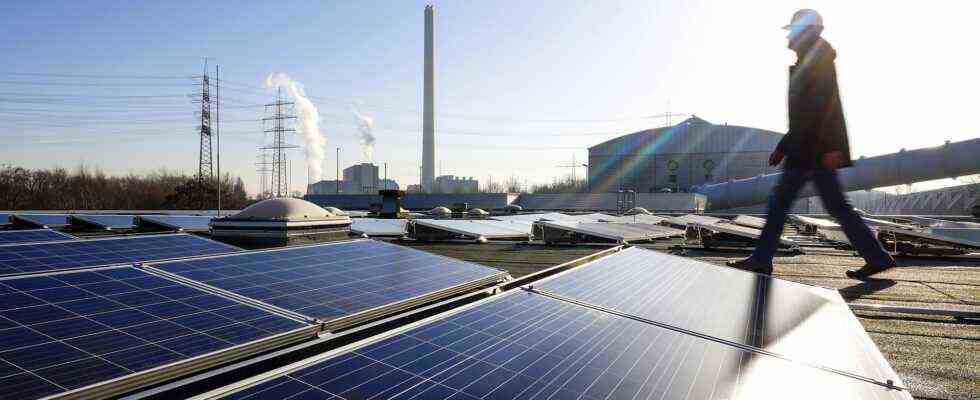As of: October 8th, 2021 8:06 am
The German solar industry, which has already been declared dead, has come to life again. At the Intersolar trade fair, she presents herself confidently and sees herself as a trailblazer for climate neutrality. Is the solar boom 2.0 coming?
The sun is rising again in the “Solar Valley” in Saxony-Anhalt. Since the Swiss plant manufacturer Meyer-Burger built two new factories for solar cells and modules in Thalheim and Freiberg in May, the attractiveness of a job in the solar industry in the region has increased by leaps and bounds. Around 300 jobs will initially be created at the two locations. In the long term, up to 3500 jobs are planned there. “We lost solar production a few years ago, and now we are bringing it back,” announced Meyer Burger Managing Director Gunter Erfurt. The Swiss are investing around 145 million euros in the new plants.
Solarwatt and Meyer-Burger open new factories
Other solar companies are also expanding. The photovoltaic manufacturer Solarwatt is expanding its production in Dresden. The company recently started a new module manufacturing facility. Solarwatt plans to invest around 35 million euros in new production facilities by 2023.
Industry circles say that in addition to Solarwatt, other German companies will increase their production capacities in Europe. “There will be news in the next few weeks and months,” says an insider.
The industry is on the brink of an unexpected comeback after almost going under ten years ago. The Chinese competition with their cheap module prices had driven the German manufacturers to ruin. Some went bankrupt, others were sold to foreign companies.
Personnel costs no longer play a role
But now German companies are suddenly competitive again in the booming world market. The rising transport costs have almost wiped out the price advantage offered by Chinese providers. The module prices have risen by ten percent since the beginning of the year, due to the lack of chips, solar modules are suddenly in short supply. In addition, personnel costs no longer play a decisive role, since production is now largely automated.
“The chances of a renaissance in the German solar industry are good,” says Carsten Körnig, managing director of the German Solar Industry Association (BSW) tagesschau.de. He points to the growing political pressure. If Germany wants to achieve its climate protection goals, the annual expansion must be more than tripled to 15 to 16 gigawatts.
BSW advocates “solar acceleration law”
The association therefore demanded a “solar acceleration law” from the future federal government. In addition, the “solar cap” should finally be abolished, which in the end slows down new investments, demands Körnig. Körnig rejects a nationwide solar roof requirement, as Baden-Württemberg will be introducing from next year. He considers more generous feed-in tariffs, which lead to a rapid amortization of investments, to be the better way.
When it comes to photovoltaics on commercial roofs, there is already considerable reluctance among investors. In the first half of the year, the expansion fell by 57 percent in May and by as much as 67 percent in June. It was only thanks to the increased demand from homeowners for photovoltaic systems that the installed output of PV systems increased by 22 percent in the first six months. For the year as a whole, the BSW predicts an increase of ten to 15 percent.
Significantly more PV power required on the way to climate neutrality
The installed capacity in Germany should therefore be around five gigawatts in 2021. Experts complain that this is far too little. In order to achieve climate neutrality by 2045, 40 gigawatts would have to be created annually, according to Volker Quaschning, Professor of Renewable Energy Systems at HTW Berlin.
Should politicians find the courage to massively expand photovoltaics, the German solar industry is likely to experience a boom similar to that of the early 2000s. The BSW lobby association dreams that there will be a good 100,000 jobs again in the solar industry by 2030. Currently there are only a good 50,000 positions. Once at the height of the German solar boom, 133,000 people worked in the solar industry.
“German manufacturers have the best chances in the premium market”
Quaschning warns against too much euphoria. The German manufacturers could not keep up in the mass market. With their market power, the Chinese would have clear advantages in terms of purchase prices. Instead, German companies should concentrate more on the premium market, where price is not so important.

